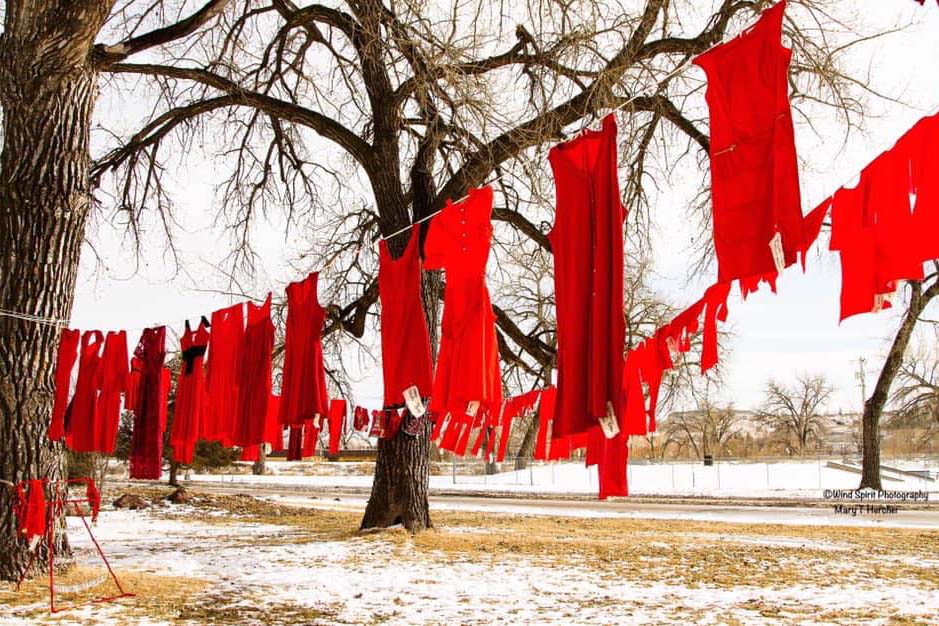
- Details
- By Levi Rickert
Late last October, the night before her 18th birthday, Mashpee Wampanoag tribal citizen Jalajhia Finklea went missing. The family remained in turmoil for the next five weeks as they waited and wondered what happened to Jalajhia.
Then the day before Thanksgiving, her dead body was found abandoned in a field off Route 95 in Fellsmere, Fla., about 1,350 miles from her home in New Bedford, Mass., near Boston. An autopsy found she had been shot in the head twice and her death was officially listed as a homicide.
The article about her death was the most read story on Native News Online in 2020, a year saturated with stories about the Covid-19 pandemic.
Jalajhia Finklea became a statistic among thousands of missing and murdered Indigenous women. But for her family, friends and tribe, she was no statistic.
“Our very deepest condolences to the family of Jalajhia,” the Mashpee Wampanoag Tribe said in a statement. “We hold them in our prayers in this most sorrowful time. We must be here for them and one another.”
For the past few years May 5 has been recognized as the National Day of Awareness for Missing and Murdered Indigenous Women (MMIW).
Deb Haaland (Laguna Pueblo), now secretary of the Interior Department, has in the past declared the crisis of missing and murdered Indigenous women and girls an epidemic.
“The epidemic of missing and murdered Indigenous women has been overlooked for far too long, but we’re finally giving a voice to this silent crisis. When your community is at risk – when it could be your daughter, your sister or your mom – the issue demands urgency. The attention this issue has received wouldn’t have been possible without the women in Indian Country saying, ‘enough is enough, we deserve to feel safe too.’ It was a call for Congress to direct real resources to the problem,” Haaland wrote in an op-ed published by Native News Online two years ago while she was in Congress.
Native women face murder rates more than 10 times the national average murder rate, more than 5,000 American Indian and Alaska Native women are missing and 55 percent of Native women have experienced domestic violence, according to the most recent data from the U.S. Department of Justice.
This issue did not just begin last decade or earlier. Experts argue the shameful and common practice of violence against Indigenous women is not a new phenomenon. Disrespect of and violence against Indigenous women and children dates back to Columbus, as his vile men raped and killed Native women. Some were taken by Columbus and his men to Europe. Once there, Indigenous women were sex trafficked.
The disrespect of Indigenous women has continued throughout American history and continues today.
As this issue receives more attention, it is more evident that it is complicated by the dismissive behavior of some law enforcement, lack of coordinated data collection between tribal, federal, state and local law enforcement, and the complexities involving human trafficking in the United States.
One step in the right direction would be the passage of the Violence Against Women Reauthorization Act. Given the ongoing epidemic in Indian Country, the Violence Against Women Reauthorization Act has the widespread support of tribes and tribal communities and Native American organizations.
Title 9 within the legislation addressing “Safety for Indian Women,” aims to improve the issue by authorizing funding for training and equipment, allowing tribal governments access to federal criminal investigation data, and creating a pilot project to allow “up to five Indian Tribes in Alaska to implement special Tribal criminal jurisdiction.”
The House of Representatives passed the Act in March. It will linger in the Senate because Republicans don’t like provisions in the Act that would forbid those convicted of assaulting women from owning guns.
During the 2020 presidential campaign, the Biden-Harris Plan for Tribal Nations committed “to break the cycle of victimization and promote accountability, partnering with tribal leaders and tribal women’s advocates to ensure tribal lands are safe and focus on ending violence against Native women and children and ending the epidemic of missing and murdered Indigenous women and girls.”
Indian Country remains hopeful more will be done during the Biden administration.
On Wednesday, wear red as a symbol of respect for our missing and murdered Indigenous sisters across Indian Country.
On the evening of Wednesday, May 5, Native News Online will host the live stream event “Crisis in Indian Country: Missing and Murdered Indigenous Women” on Facebook and YouTube at 7 p.m. EDT.
More Stories Like This
The Lie We Keep Telling About Wounded KneeAnother Weapon of Mass Destruction
Colorado cannot heal until it confronts Sand Creek honestly
Native American Mothers Deserve to Live
Technology Rooted in Tradition is Strengthening Cherokee Nation
Help us defend tribal sovereignty.
At Native News Online, our mission is rooted in telling the stories that strengthen sovereignty and uplift Indigenous voices — not just at year’s end, but every single day.
Because of your generosity last year, we were able to keep our reporters on the ground in tribal communities, at national gatherings and in the halls of Congress — covering the issues that matter most to Indian Country: sovereignty, culture, education, health and economic opportunity.
That support sustained us through a tough year in 2025. Now, as we look to the year ahead, we need your help right now to ensure warrior journalism remains strong — reporting that defends tribal sovereignty, amplifies Native truth, and holds power accountable.
 The stakes couldn't be higher. Your support keeps Native voices heard, Native stories told and Native sovereignty defended.
The stakes couldn't be higher. Your support keeps Native voices heard, Native stories told and Native sovereignty defended.
Stand with Warrior Journalism today.
Levi Rickert (Potawatomi), Editor & Publisher

